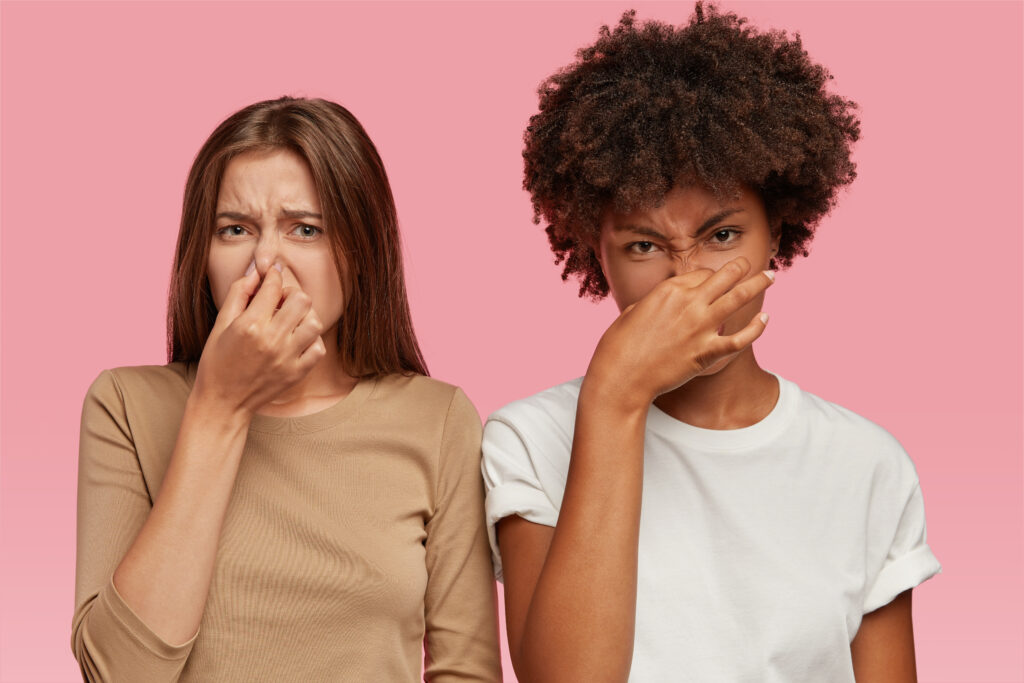Have you ever caught a whiff of your shirt midday and wondered, “Why do I smell weird? I’m clean!” You’re not imagining things—and it’s not just about sweat. The way you smell is the result of a complex interaction between your laundry products, personal care items, diet, water quality, and natural body chemistry.
This guide unpacks the surprising science of why “clean” isn’t always odor-free, and how common everyday products may be colliding to create unexpected (and unwelcome) smells.
It Starts With Sweat… But That’s Just the Beginning
Sweat itself is mostly odorless. Body odor actually forms when sweat interacts with bacteria on your skin—or when it reacts with residue in your clothing.
Now, think about how many things layer on top of your body every day:
- Lotion
- Deodorant (often with aluminum)
- Fragrance or body spray
- Body wash or soap
- Clothing washed with detergent and softeners
Each of these products contains its own chemical compounds. When combined with heat, moisture, and your personal microbiome, these layers can cause surprising scent changes—even shortly after putting on freshly washed clothes.
Skincare Products + Fabric = Residue Trap
Lotions, oils, and deodorants often contain:
- Silicones (like dimethicone) – create a barrier on the skin but can transfer to clothes, resisting water during washes.
- Emollients (e.g., shea butter, mineral oil) – nourish skin but are oil-based, making them hard to remove from fabric.
- Fragrance chemicals (e.g., limonene, linalool) – oxidize with heat and time, sometimes creating unpleasant smells.
When these ingredients transfer to clothing, especially synthetics, they don’t rinse out easily. Over time, they can build up and form a greasy layer that traps odors, skin cells, and bacteria—particularly in tight areas like underarms, waistbands, or chest areas.
The Role of Detergent Residue
Many commercial detergents leave behind a residue of:
- Synthetic surfactants that don’t fully rinse away
- Fragrance encapsulates that release scent with friction or heat
- Optical brighteners that reflect light to make clothes look cleaner
These ingredients can layer onto fabrics, especially if you’re using too much detergent, washing in cold water, or have hard water. Once trapped in fabric, they can interact with your body’s oils, lotions, and sweat, creating chemical reactions that result in sour, metallic, or “mildewy” smells—especially when clothes are warmed by body heat.
Hard Water, Sulfur, and Metallic Smells
Your water quality has a huge impact on laundry—and your scent.
If you have hard water:
- Minerals like calcium and magnesium reduce detergent efficiency.
- Detergent binds to minerals instead of cleaning fabric.
- Clothes come out with residual dirt, oil, and detergent, which leads to odor.
If your water contains iron or sulfur:
- Iron can react with sweat and deodorant, causing rust-like or musty smells.
- Sulfur gives off a rotten egg odor and can amplify smells in sweaty areas.
Even if your clothes look clean, mineral buildup and trapped odor molecules can react when you move, sweat, or get warm.
Common Chemical Reactions That Cause Odor
Aluminum + Sweat (from antiperspirants)
Aluminum-based deodorants block sweat glands but can mix with sweat and proteins to form:
- Yellow stains on clothes
- A metallic or sour odor, especially in the underarms
- Residue that builds up and reacts with detergents, creating lasting odor even after washing
Fragrance + Skin pH + Heat
Fragrance compounds aren’t one-size-fits-all. They react differently depending on your:
- Skin pH and microbiome
- Dietary choices
- Lotions or products used underneath
This is why a perfume or detergent might smell great on someone else but turn “off” or sour on your body.
Diet + Sweat Chemistry
What you eat affects your body odor. For example:
- Garlic, onions, and curry can release sulfurous compounds through your sweat.
- Red meat has been linked to more intense body odor in some studies.
- Asparagus can create a unique ammonia-like scent for some people.
These foods don’t just influence your body’s scent—they can linger in your clothing and mix with other compounds during laundering.
ou’re Not Dirty—You’re Just Chemically Complex
This isn’t about being “unclean.” Many people with excellent hygiene experience odor issues caused by:
- Product buildup on skin and clothing
- Poor detergent rinsing
- Synthetic fabrics that trap oils
- Personal pH and microbiome differences
Everyone’s scent is a unique signature—and when it gets mixed with layers of modern chemicals and water variables, it can take unexpected turns.
What You Can Do to Fix It
1. Switch to Fragrance-Free or Enzyme-Based Detergents
Choose biodegradable detergents with natural enzymes that actually break down bacteria, oils, and odors.
Great options:
- Molly’s Suds – minimal, clean ingredients
- Branch Basics – non-toxic and effective
- Seventh Generation Free & Clear – accessible and gentle
2. Strip Laundry Monthly
Use a mix of:
- 1/4 cup baking soda
- 1/4 cup washing soda
- 1/4 cup borax
- Hot water soak for 4–6 hours (or overnight)
This removes buildup from detergents, softeners, oils, and skincare products.
3. Wear Natural Fibers When Possible
Fabrics like cotton, bamboo, hemp, and wool are more breathable and easier to clean. They don’t trap oils and odors the way synthetics do.
4. Be Mindful of Product Layering
- Apply lotion and deodorant after your skin is dry.
- Let products absorb before getting dressed.
- Use lighter, non-greasy lotions on areas that tend to trap sweat.
5. Treat Your Water If Needed
- Water softeners can improve detergent performance.
- Shower filters can help reduce skin reactions that affect your natural scent.
Final Thoughts
Sometimes the mystery behind “why do I smell weird” has nothing to do with your hygiene—and everything to do with the chemistry experiment happening on your clothes and skin. By understanding how detergents, skincare, water, and even your diet interact, you can take steps to reduce odor naturally and safely.
Your body isn’t the problem. Your products might be.








